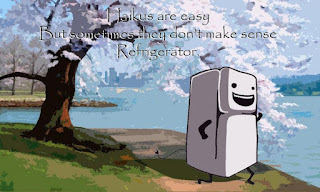I speak of the humble haiku. Haiku seem, on the surface to be super easy: three lines, 5-7-5 syllables. Some nature and a season. How hard could that be?
I like brevity. In fact, I have a whole collection of poems I'm working on that are seven lines or less. And I love to write about nature. So you'd think I'd be a natural at haiku. I certainly have tried. Faithfully. Every single year. Some of them I was quite proud of.
 |
| Bluebonnets growing Alongside a picket fence: Ancient settlers here. (1993) |
Despite dozens of efforts at haiku, I've had exactly two successes. In 2013, I won the adult category in the "Stand Up for Safe Families" child abuse prevention contest with the poem "After."
 After
AfterScreaming comes the flood,
He flings boulders from the cliff
Heedless of destruction.
Trapped in the log dam
Child of the river trembles
Hopeless of escape.
His wrath all but spent
Dark river slinks to the sea
Past debris unseen.
In emerging day
River's child finds wobbling legs
To seek out the light.
Now, this one makes no sense. It's not a haiku but a longish poem written in three-line stanzas. There's no pivot. No season. Not all of the lines are 5-7-5. Sure, there's some angry nature, but it's very clearly metaphorical nature, which, I am told, makes it a senryu. And yet, I got to tell my survivor story into a microphone at Lady Bird Lake and walk away with a very nice gift bag.
Then there's this one, which won 3rd place in the 2016 Austin Poetry Society awards.
 |
No moon burns tonight
Stars smolder in dark blankets:
Tomorrow you leave.
|
So, we do have a rigid 5-7-5 pattern and some nature, plus, at least arguably, a pivot. No season. Just oodles and oodles of emo. Is it a haiku? A senryu? A senku? A haiyu? Free verse that's just pretending?
Clearly, there's something more to the humble haiku.
So, I attended the October meeting of the Austin Poetry Society, hoping for enlightenment from the guest speaker, Agnes Eva Savich, who has had hundreds of haiku published.
Agnes read dozens of her published haiku. And pointing out how many of them didn't follow 'the rules'...but somehow still worked. It turns out that 5-7-5 isn't required, unless it is. A seasonal reference and nature are generally required...unless they're not. A grouping of two lines and one line works, and a grouping of one line and two lines works, but three individual lines or a grouping of three lines does not...unless it does.
Agnes passed around dozens of haiku publications and I leafed through them, looking for clues. Some I liked. Many I just didn't get. Few of them followed all of 'the rules.' And then, at last, I got enlightenment. Not about the nature of haiku. I'm still completely flummoxed by that. No, I got enlightenment on why haiku give me a headache.
 |
| Eleanor and Bruce, 2009 He is a sequin-caped firefighting hunter under the authoritarian rule of a princess fairy, and he is clearly questioning his life choices. |
Eleanor: ...so you have to touch the ball to your forehead and then run to the wall and drop it in the trashcan six times but you can't step on even numbered boards.
Me: okaaay?!#?
I touch the ball to my forehead, run to wall, drop it in trashcan six times without stepping on even numbered boards.
Eleanor: I win!
Me: What?
Eleanor: You swung your left arm.
Me: Was that a rule????
Eleanor: Yes. So I win.
Me: That's not fair. You swung your left arm, too.
Eleanor, patiently: Yes, but I'm the arm swinger. It's okay. You can't swing your arm except if you're on the right side and you're the arm swinger, which I am. So I win.
Me: But last time you were on the left side and you also swung your arm and you still won.
Eleanor, with an exasperated sigh: Look, Mom. On even numbered games the sides switch. Aren't you even listening?
And this is my experience with the haiku. It is exactly like listening to a seven-year-old explain a made up game with more rules and sub-clauses than the average iPhone privacy agreement. They are beautiful. They are creative. And I absolutely don't get them.
That's okay, because the poetry world is a wild, wide exciting place, full of strange and wonderful landscapes. It's big enough for form and free verse, for epics and haiku. I can visit Haiku Land and appreciate the scenery...and then go back to my familiar homeland and write poetry that makes me happy--or at the least, doesn't give me headaches.
 |
| Word. |






